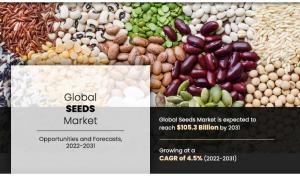Seed Market Research Report, Analysis, Size, Share, Growth, Trends, Opportunities and Forecast to 2031
Timely availability of high-quality seeds in appropriate quantity determines the strength and health of an agricultural economy.
PORTLAND, OR, UNITED STATES, July 4, 2023/EINPresswire.com/ -- According to a new report published by Allied Market Research, titled, “Seed Market1 by Type, Crop, Availability, Seed Treatment, and Seed Trait: Global Opportunity Analysis and Industry Forecast, 2022–2031,” The seed market size was valued at $58.5 billion in 2020, and is expected to reach at $105.3 billion by 2031, registering a CAGR of 4.5% from 2022 to 2031. The field crops segment was dominant in 2020, accounting for more than half of the seed market share, in terms of volume.
Download Free Sample PDF@ https://www.alliedmarketresearch.com/request-sample/2384
A small embryonic plant enclosed within a protective covering is known as a seed. Seed serves various functions for plants, such as nourishment of the embryo, dispersal to a new location, and dormancy during unfavorable conditions. Timely availability of high-quality seeds in appropriate quantity determines the strength and health of an agricultural economy. Sophistication of seed technologies such as seed pelleting, rise in usage of biofuels & animal feed, and increasingly accommodative regulatory stance are major factors that drive the seed market industry growth. Global population is estimated to reach 9 billion by 2050, and is expected to require twice the food, which is predicted to be produced from constant land area. More production is anticipated to be accomplished from less land only by using the combination of quality seeds, quality inputs, and enhancing farm practices.
Global Key Players:
Advanta Limited (India),
Bayer CropScience AG (Germany),
DLF Seeds A/S (Denmark),
DOW Agrosciences LLC (U.S.),
E.I Du Pont De Nemours and Company (U.S.),
Groupe Limagrain Holding SA (France),
KWS AG (Germany),
Land O' Lakes, Inc. (U.S.),
Sakata Seed Corporation (Japan),
Syngenta AG (Switzerland).
The seed market is segmented on the basis of type, crop, availability, seed treatment, seed trait, and geography. By type, the market is classified into genetically modified (GM) seed and conventional seed. On the basis of crop, it is bifurcated into field crops and fruits & vegetable crops. The field crops segment is divided into cotton, corn, rice, wheat, millet, sunflower, and sorghum. The fruits & vegetable crops segment is further classified into tomato, okra, chili, melon, gourds, cauliflower, cabbage, cucumber, and others (eggplant, pumpkin, radish, and carrot). On the basis of availability, the market is categorized into commercial seeds and saved seeds. On the basis of seed treatment, it is classified into treated and untreated. On the basis of seed trait, it is divided into herbicide tolerant, insecticide resistant, and other stacked traits. Geographically, the market is analyzed across North America, Europe, Asia-Pacific, and LAMEA.
Request For Customization @ https://www.alliedmarketresearch.com/request-for-customization/2384
The genetically modified (GM) seed segment is anticipated to grow at a high CAGR during the seed market forecast period. Crops produced using genetically modified (GM) seeds are of enhanced quality and contain additional amount of nutrients in them.
In 2020, the field crops segment accounted for more than half of the market, in terms of volume. Rise in seed replacement rate in cultivation areas, ongoing R&D activities by seed manufacturers, and intensive agricultural practices utilized by farmers to increase crop yield & productivity are the major factors that drive the growth of field crops segments across the globe.
The commercial seeds segment is projected to grow at a significant CAGR during the forecast period. Expanding global population is anticipated to escalate the demand for commercial seeds across the globe. Decline in global arable land acts as a driver for commercial seeds segment, as these seeds yield higher output.
The treated seeds segment accounted for the maximum share, in terms of both volume and revenue, in 2020, as these seeds save post sowing cost of spraying and make crops tolerant to various soil-borne and other diseases. Furthermore, treated seeds assist to increasing productivity and provide benefits to farmers in terms of cost.
Key Findings Of The Study
Asia-Pacific is expected to lead the market during the forecast period, followed by the LAMEA region.
The fruit & vegetable crops segment dominated the market in the year 2020.
The treated seeds segment registered the highest growth rate, in terms of volume, in 2020.
On the basis of seed traits, the other stacked traits segment dominated the market in the year 2020.
On the basis of availability, the commercial seeds segment is expected to have the highest CAGR during the forecast period.
By type, the GM seeds segment is expected to have the fastest growth rate during the forecast period.
North America and Asia-Pacific collectively, accounted for more than half of the seed market Trends to the global seed market revenue, in 2020. In the same year, Asia-Pacific dominated the market, owing to the increase in demand for enhanced agricultural products.
Full Browse Report with TOC@ https://www.alliedmarketresearch.com/seed-market
David Correa
Allied Analytics LLP
+ + 1-800-792-5285
email us here
1 https://www.alliedmarketresearch.com/seed-market

